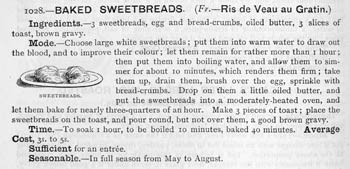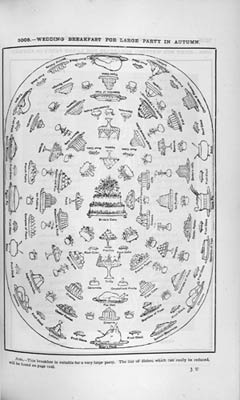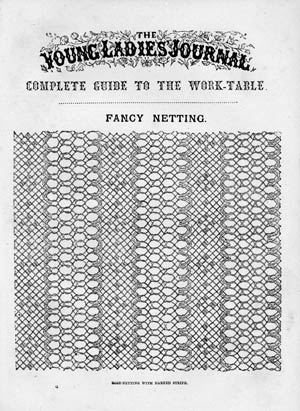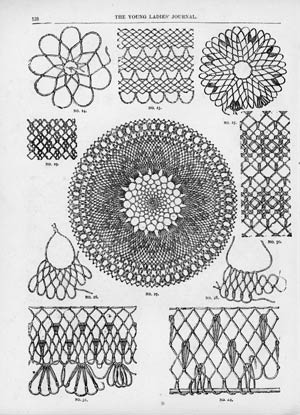![]()
NOTES ON ISSUE 4: GLOSSARY
The wounds of which
she had spoken, seemed to be about the neck of the self-made outcast. She dressed
them now, still without showing her. She steeped a piece of linen in a basin,
into which she poured some liquid from a bottle and laid it with a gentle hand
upon the sore.
The "wounds" Mrs. Blackpool has on her neck may be syphilitic sores;
the throat is one site on which such sores may develop. The "liquid"
with which Rachael treats them would probably have been a solution made with
mercury, which would be highly poisonous and marked as such—hence Stephen's
horror at seeing "what was printed on [the bottle] in large letters"
and his later, troubled dreams.
exercised him diligently in his calculations relative
to number one
That is, Tom is thinking of himself first.
the Calmucks of Tartary
A nomadic tribe living between the Volga river and the Caspian Sea.
strongest smelling-salts
A common remedy for fainting in the Victorian period, made up of carbonate of
ammonia and perfumes.
light porter
A worker, as in a bank, whose duties involve carrying light packages.
She might have said the sweetbread, for that delicate
article in a savoury brown sauce was her favorite supper
Sweetbreads are the thymus glands of calves or lambs, and were a much-prized
delicacy of the Victorian era. Because they must be cooked when very fresh and
also must be soaked for several hours before cooking, they were generally a
luxury item. Mrs. Beeton, in her Book of Household Management, includes
both recipes and an illustration:

Love was made on these occasions in the form of
bracelets; and, on all occasions during the period of betrothal, took a manufacturing
aspect. Dresses were made, jewellery was made, cakes and gloves were made, settlements
were made…
Victorian wedding preparations included not only the
making of the trousseau (the dresses and other articles the bride would take
to her new home) but also the wedding cake, which was similar to present-day
fruitcake and thus was made well in advance. Settlements were financial arrangements
providing for the wife as well as for the couple's future children. Until 1870,
according to British law married women could not own property separately; all
property she brought to the marriage belonged to her husband. The exception
to this law was money or property placed in trust for her or her children, or
"settled" on her. Making such settlements protected the wife's interests
in case her husband suffered financial setbacks or died and left his widow without
income. Arranging for such settlements was an important part of the financial
negotiations surrounding a bourgeois marriage at the time.
when they were united in holy matrimony they went
home to breakfast…
The wedding-breakfast was an important part of Victorian
weddings, akin to (but generally less elaborate than) the reception today. The
law at the time required that marriage ceremonies take place before noon, meaning
that the primary form of celebration afterward was a breakfast. Wedding breakfasts
could range from simple repasts of cake and champagne to this elegant, elaborate
spread, depicted in Mrs. Beeton's Book of Household Management. Given
the practical nature of the principals and their aversion to sentimental display,
wedding-breakfast for Louisa and Bounderby would probably have fallen somewhere
between the two extremes.

Click
on image for larger view
in what bottoms
That is, in the holds of what ships.
fit helpmates for the calculating boy
The "calculating boy" may refer to George Bidder
(1806-78), a mathematical prodigy who was publicly exhibited during the nineteenth
century.
a nuptial trip to Lyons
Lyons was a major center of silk manufacturing, so the
honeymoon trip to Lyons is hardly a romantic escape; rather, it is probably
more business than pleasure for Bounderby. Dickens was appalled when he visited
Lyons, and wrote of the city in Pictures from Italy (1846):
What a city Lyons is!…The two great streets through which the two great rivers dash, and all the little streets whose name is Legion, were scorching, blistering, and sweltering. The houses, high and vast, dirty to excess, rotten as old cheeses, and as thickly peopled. All up in the hills that hem the city in, these houses swarm; and the mites inside were lolling out of the windows, and drying their ragged clothes on poles, and crawling in and out at the doors, and coming out to pant and gasp upon the pavement, and creeping in and out among huge piles and bales of fusty, musty, stifling goods; and living, or rather not dying till their time should come, in an exhausted receiver. Every manufacturing town, melted into one, would hardly convey an impression of Lyons as it presented itself to me: for all the undrained, unscavengered qualities of a foreign town seemed engrafted, there, upon the native miseries of a manufacturing one; and it bears such fruit as I would go some miles out of my way to avoid encountering again.

